NRSG370 Case Study: Addressing Mr. Williamson's Aged Care Challenges
VerifiedAdded on 2022/10/02
|10
|2831
|472
Case Study
AI Summary
This case study analyzes the complex care needs of Mr. Williamson, a 90-year-old patient in an aged care facility, focusing on his recent hip replacement, Alzheimer's disease, and vascular dementia. The assignment explores the challenges of immobility, memory loss, and hearing impairment, and their impact on his daily life and independence. The document highlights the importance of addressing these issues through a holistic care plan that considers both physical and psychological aspects. It emphasizes the significance of effective communication, medication management, and the development of a therapeutic relationship between the carer and the patient. The reflection section provides insights into the nursing skills required for such complex cases, including critical analysis, goal setting, and the implementation of self-management strategies. The case study underscores the need for individualized care plans, focusing on the patient's mental stability, and the importance of family involvement to improve outcomes and quality of life.
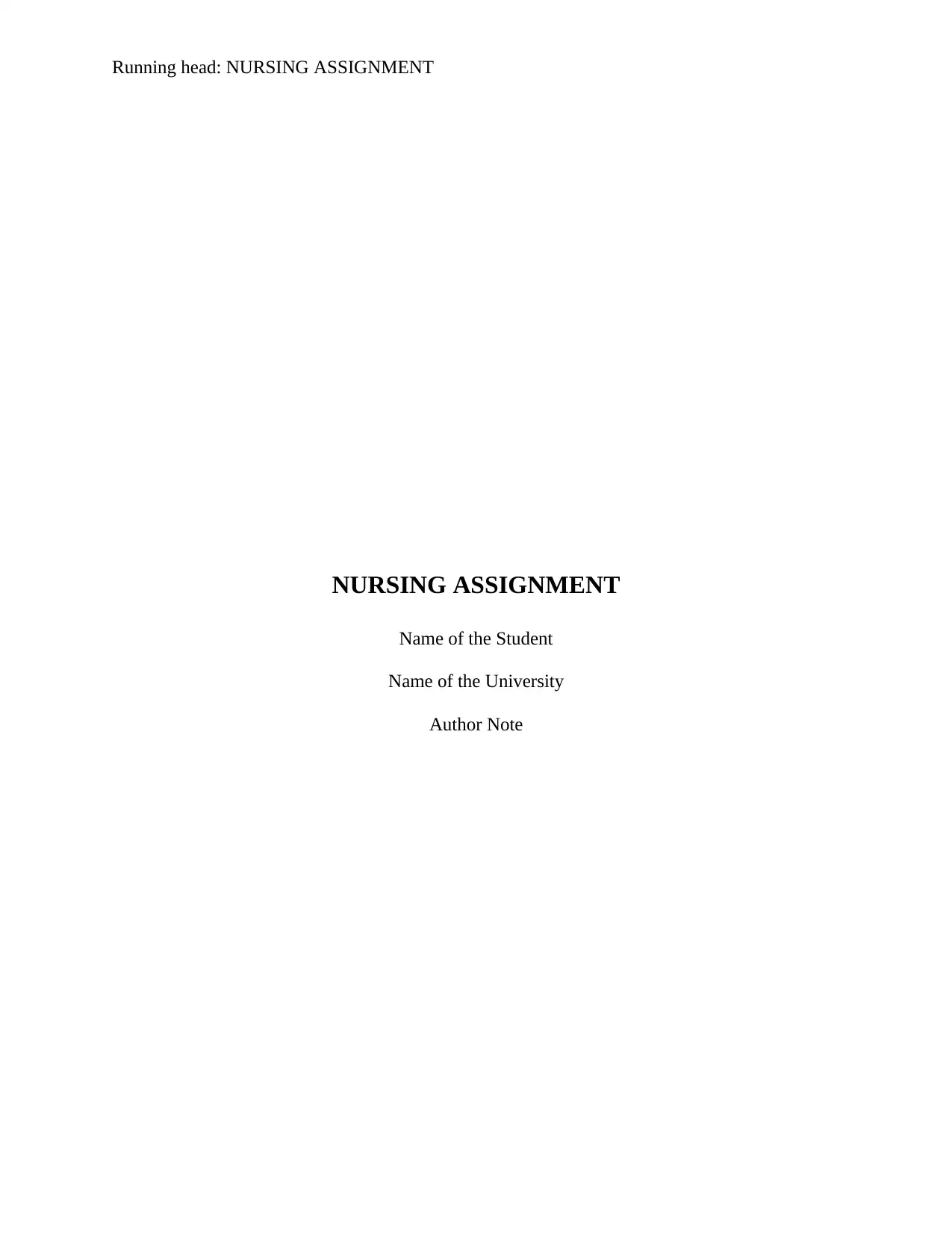
Running head: NURSING ASSIGNMENT
NURSING ASSIGNMENT
Name of the Student
Name of the University
Author Note
NURSING ASSIGNMENT
Name of the Student
Name of the University
Author Note
Paraphrase This Document
Need a fresh take? Get an instant paraphrase of this document with our AI Paraphraser
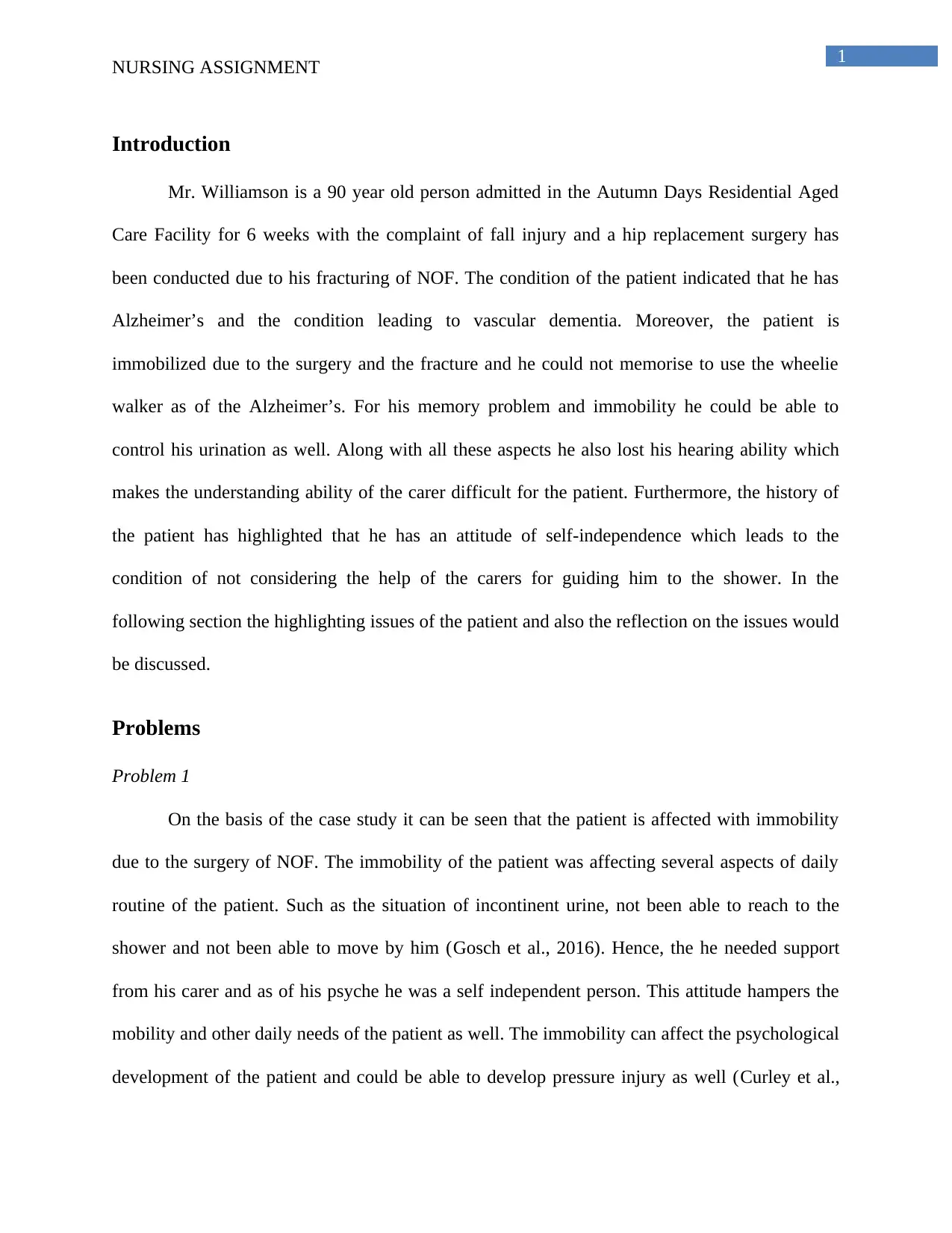
1
NURSING ASSIGNMENT
Introduction
Mr. Williamson is a 90 year old person admitted in the Autumn Days Residential Aged
Care Facility for 6 weeks with the complaint of fall injury and a hip replacement surgery has
been conducted due to his fracturing of NOF. The condition of the patient indicated that he has
Alzheimer’s and the condition leading to vascular dementia. Moreover, the patient is
immobilized due to the surgery and the fracture and he could not memorise to use the wheelie
walker as of the Alzheimer’s. For his memory problem and immobility he could be able to
control his urination as well. Along with all these aspects he also lost his hearing ability which
makes the understanding ability of the carer difficult for the patient. Furthermore, the history of
the patient has highlighted that he has an attitude of self-independence which leads to the
condition of not considering the help of the carers for guiding him to the shower. In the
following section the highlighting issues of the patient and also the reflection on the issues would
be discussed.
Problems
Problem 1
On the basis of the case study it can be seen that the patient is affected with immobility
due to the surgery of NOF. The immobility of the patient was affecting several aspects of daily
routine of the patient. Such as the situation of incontinent urine, not been able to reach to the
shower and not been able to move by him (Gosch et al., 2016). Hence, the he needed support
from his carer and as of his psyche he was a self independent person. This attitude hampers the
mobility and other daily needs of the patient as well. The immobility can affect the psychological
development of the patient and could be able to develop pressure injury as well (Curley et al.,
NURSING ASSIGNMENT
Introduction
Mr. Williamson is a 90 year old person admitted in the Autumn Days Residential Aged
Care Facility for 6 weeks with the complaint of fall injury and a hip replacement surgery has
been conducted due to his fracturing of NOF. The condition of the patient indicated that he has
Alzheimer’s and the condition leading to vascular dementia. Moreover, the patient is
immobilized due to the surgery and the fracture and he could not memorise to use the wheelie
walker as of the Alzheimer’s. For his memory problem and immobility he could be able to
control his urination as well. Along with all these aspects he also lost his hearing ability which
makes the understanding ability of the carer difficult for the patient. Furthermore, the history of
the patient has highlighted that he has an attitude of self-independence which leads to the
condition of not considering the help of the carers for guiding him to the shower. In the
following section the highlighting issues of the patient and also the reflection on the issues would
be discussed.
Problems
Problem 1
On the basis of the case study it can be seen that the patient is affected with immobility
due to the surgery of NOF. The immobility of the patient was affecting several aspects of daily
routine of the patient. Such as the situation of incontinent urine, not been able to reach to the
shower and not been able to move by him (Gosch et al., 2016). Hence, the he needed support
from his carer and as of his psyche he was a self independent person. This attitude hampers the
mobility and other daily needs of the patient as well. The immobility can affect the psychological
development of the patient and could be able to develop pressure injury as well (Curley et al.,
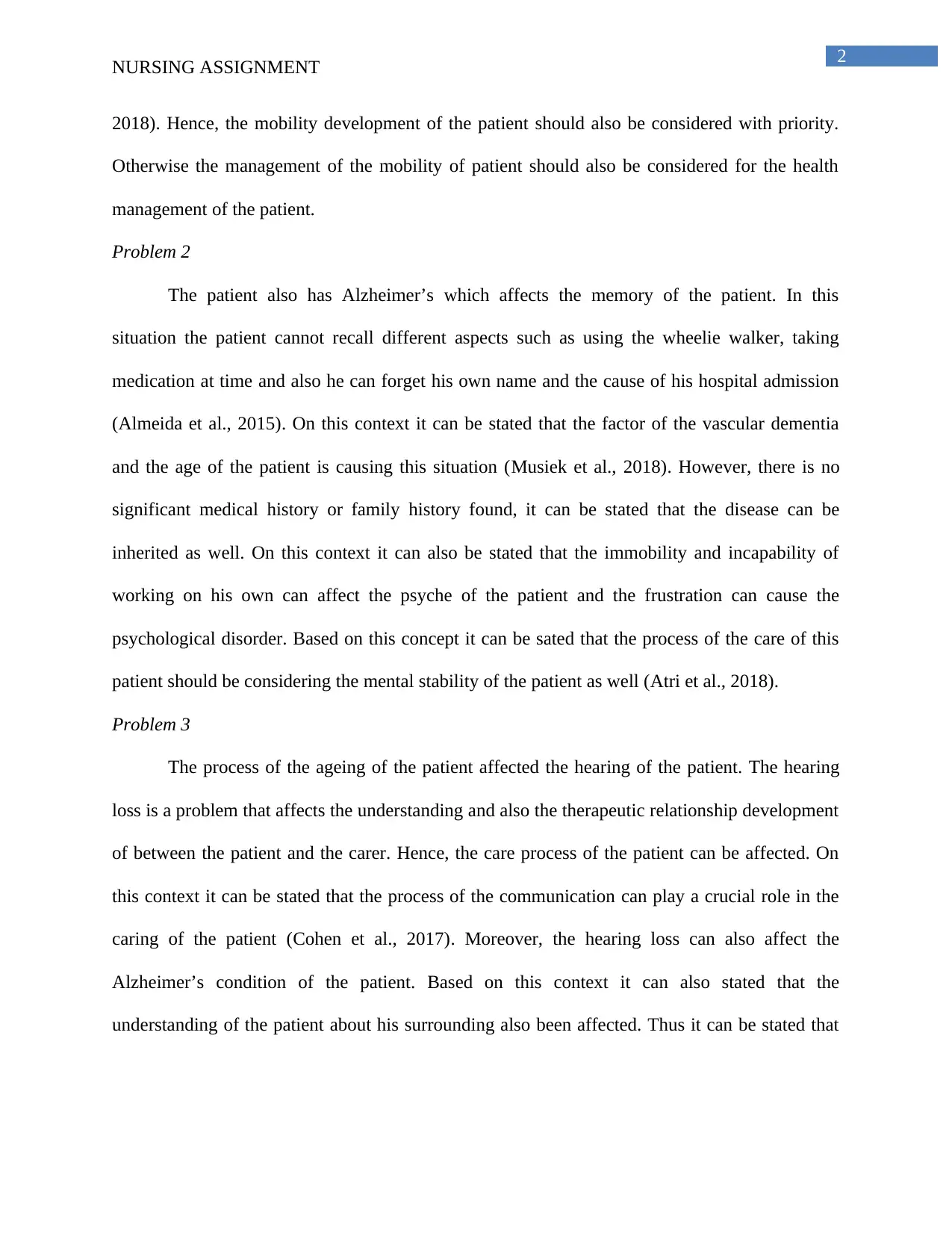
2
NURSING ASSIGNMENT
2018). Hence, the mobility development of the patient should also be considered with priority.
Otherwise the management of the mobility of patient should also be considered for the health
management of the patient.
Problem 2
The patient also has Alzheimer’s which affects the memory of the patient. In this
situation the patient cannot recall different aspects such as using the wheelie walker, taking
medication at time and also he can forget his own name and the cause of his hospital admission
(Almeida et al., 2015). On this context it can be stated that the factor of the vascular dementia
and the age of the patient is causing this situation (Musiek et al., 2018). However, there is no
significant medical history or family history found, it can be stated that the disease can be
inherited as well. On this context it can also be stated that the immobility and incapability of
working on his own can affect the psyche of the patient and the frustration can cause the
psychological disorder. Based on this concept it can be sated that the process of the care of this
patient should be considering the mental stability of the patient as well (Atri et al., 2018).
Problem 3
The process of the ageing of the patient affected the hearing of the patient. The hearing
loss is a problem that affects the understanding and also the therapeutic relationship development
of between the patient and the carer. Hence, the care process of the patient can be affected. On
this context it can be stated that the process of the communication can play a crucial role in the
caring of the patient (Cohen et al., 2017). Moreover, the hearing loss can also affect the
Alzheimer’s condition of the patient. Based on this context it can also stated that the
understanding of the patient about his surrounding also been affected. Thus it can be stated that
NURSING ASSIGNMENT
2018). Hence, the mobility development of the patient should also be considered with priority.
Otherwise the management of the mobility of patient should also be considered for the health
management of the patient.
Problem 2
The patient also has Alzheimer’s which affects the memory of the patient. In this
situation the patient cannot recall different aspects such as using the wheelie walker, taking
medication at time and also he can forget his own name and the cause of his hospital admission
(Almeida et al., 2015). On this context it can be stated that the factor of the vascular dementia
and the age of the patient is causing this situation (Musiek et al., 2018). However, there is no
significant medical history or family history found, it can be stated that the disease can be
inherited as well. On this context it can also be stated that the immobility and incapability of
working on his own can affect the psyche of the patient and the frustration can cause the
psychological disorder. Based on this concept it can be sated that the process of the care of this
patient should be considering the mental stability of the patient as well (Atri et al., 2018).
Problem 3
The process of the ageing of the patient affected the hearing of the patient. The hearing
loss is a problem that affects the understanding and also the therapeutic relationship development
of between the patient and the carer. Hence, the care process of the patient can be affected. On
this context it can be stated that the process of the communication can play a crucial role in the
caring of the patient (Cohen et al., 2017). Moreover, the hearing loss can also affect the
Alzheimer’s condition of the patient. Based on this context it can also stated that the
understanding of the patient about his surrounding also been affected. Thus it can be stated that
⊘ This is a preview!⊘
Do you want full access?
Subscribe today to unlock all pages.

Trusted by 1+ million students worldwide
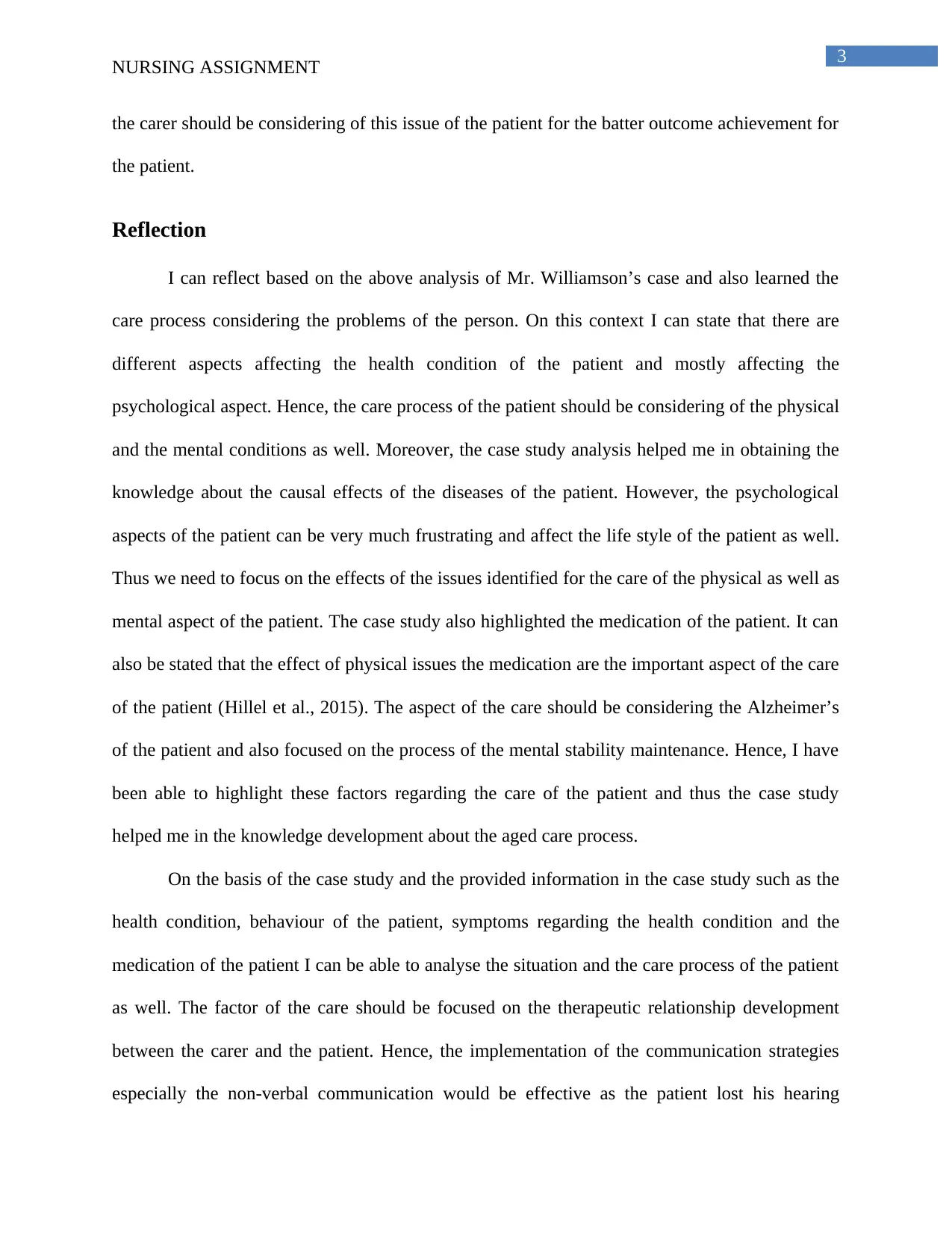
3
NURSING ASSIGNMENT
the carer should be considering of this issue of the patient for the batter outcome achievement for
the patient.
Reflection
I can reflect based on the above analysis of Mr. Williamson’s case and also learned the
care process considering the problems of the person. On this context I can state that there are
different aspects affecting the health condition of the patient and mostly affecting the
psychological aspect. Hence, the care process of the patient should be considering of the physical
and the mental conditions as well. Moreover, the case study analysis helped me in obtaining the
knowledge about the causal effects of the diseases of the patient. However, the psychological
aspects of the patient can be very much frustrating and affect the life style of the patient as well.
Thus we need to focus on the effects of the issues identified for the care of the physical as well as
mental aspect of the patient. The case study also highlighted the medication of the patient. It can
also be stated that the effect of physical issues the medication are the important aspect of the care
of the patient (Hillel et al., 2015). The aspect of the care should be considering the Alzheimer’s
of the patient and also focused on the process of the mental stability maintenance. Hence, I have
been able to highlight these factors regarding the care of the patient and thus the case study
helped me in the knowledge development about the aged care process.
On the basis of the case study and the provided information in the case study such as the
health condition, behaviour of the patient, symptoms regarding the health condition and the
medication of the patient I can be able to analyse the situation and the care process of the patient
as well. The factor of the care should be focused on the therapeutic relationship development
between the carer and the patient. Hence, the implementation of the communication strategies
especially the non-verbal communication would be effective as the patient lost his hearing
NURSING ASSIGNMENT
the carer should be considering of this issue of the patient for the batter outcome achievement for
the patient.
Reflection
I can reflect based on the above analysis of Mr. Williamson’s case and also learned the
care process considering the problems of the person. On this context I can state that there are
different aspects affecting the health condition of the patient and mostly affecting the
psychological aspect. Hence, the care process of the patient should be considering of the physical
and the mental conditions as well. Moreover, the case study analysis helped me in obtaining the
knowledge about the causal effects of the diseases of the patient. However, the psychological
aspects of the patient can be very much frustrating and affect the life style of the patient as well.
Thus we need to focus on the effects of the issues identified for the care of the physical as well as
mental aspect of the patient. The case study also highlighted the medication of the patient. It can
also be stated that the effect of physical issues the medication are the important aspect of the care
of the patient (Hillel et al., 2015). The aspect of the care should be considering the Alzheimer’s
of the patient and also focused on the process of the mental stability maintenance. Hence, I have
been able to highlight these factors regarding the care of the patient and thus the case study
helped me in the knowledge development about the aged care process.
On the basis of the case study and the provided information in the case study such as the
health condition, behaviour of the patient, symptoms regarding the health condition and the
medication of the patient I can be able to analyse the situation and the care process of the patient
as well. The factor of the care should be focused on the therapeutic relationship development
between the carer and the patient. Hence, the implementation of the communication strategies
especially the non-verbal communication would be effective as the patient lost his hearing
Paraphrase This Document
Need a fresh take? Get an instant paraphrase of this document with our AI Paraphraser
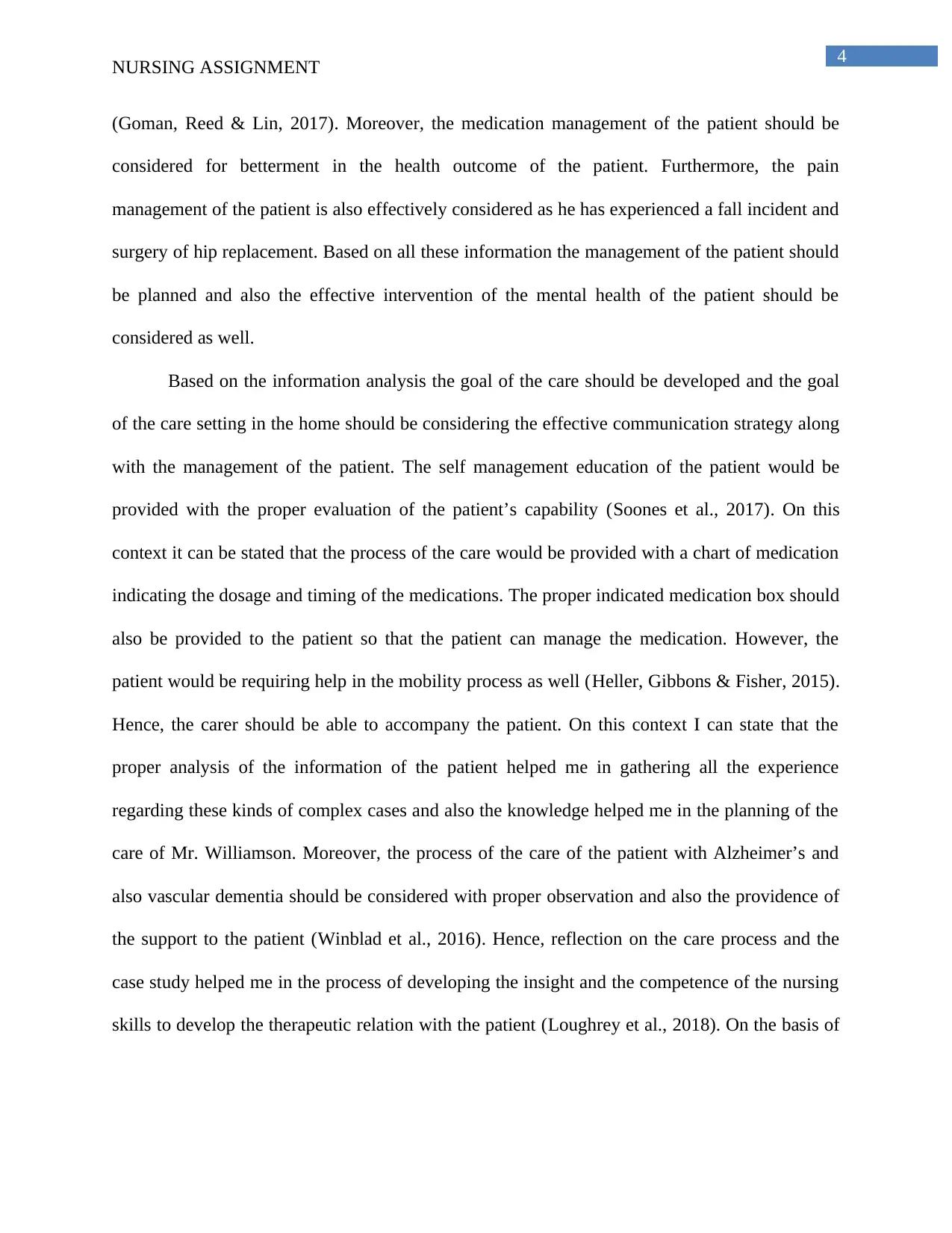
4
NURSING ASSIGNMENT
(Goman, Reed & Lin, 2017). Moreover, the medication management of the patient should be
considered for betterment in the health outcome of the patient. Furthermore, the pain
management of the patient is also effectively considered as he has experienced a fall incident and
surgery of hip replacement. Based on all these information the management of the patient should
be planned and also the effective intervention of the mental health of the patient should be
considered as well.
Based on the information analysis the goal of the care should be developed and the goal
of the care setting in the home should be considering the effective communication strategy along
with the management of the patient. The self management education of the patient would be
provided with the proper evaluation of the patient’s capability (Soones et al., 2017). On this
context it can be stated that the process of the care would be provided with a chart of medication
indicating the dosage and timing of the medications. The proper indicated medication box should
also be provided to the patient so that the patient can manage the medication. However, the
patient would be requiring help in the mobility process as well (Heller, Gibbons & Fisher, 2015).
Hence, the carer should be able to accompany the patient. On this context I can state that the
proper analysis of the information of the patient helped me in gathering all the experience
regarding these kinds of complex cases and also the knowledge helped me in the planning of the
care of Mr. Williamson. Moreover, the process of the care of the patient with Alzheimer’s and
also vascular dementia should be considered with proper observation and also the providence of
the support to the patient (Winblad et al., 2016). Hence, reflection on the care process and the
case study helped me in the process of developing the insight and the competence of the nursing
skills to develop the therapeutic relation with the patient (Loughrey et al., 2018). On the basis of
NURSING ASSIGNMENT
(Goman, Reed & Lin, 2017). Moreover, the medication management of the patient should be
considered for betterment in the health outcome of the patient. Furthermore, the pain
management of the patient is also effectively considered as he has experienced a fall incident and
surgery of hip replacement. Based on all these information the management of the patient should
be planned and also the effective intervention of the mental health of the patient should be
considered as well.
Based on the information analysis the goal of the care should be developed and the goal
of the care setting in the home should be considering the effective communication strategy along
with the management of the patient. The self management education of the patient would be
provided with the proper evaluation of the patient’s capability (Soones et al., 2017). On this
context it can be stated that the process of the care would be provided with a chart of medication
indicating the dosage and timing of the medications. The proper indicated medication box should
also be provided to the patient so that the patient can manage the medication. However, the
patient would be requiring help in the mobility process as well (Heller, Gibbons & Fisher, 2015).
Hence, the carer should be able to accompany the patient. On this context I can state that the
proper analysis of the information of the patient helped me in gathering all the experience
regarding these kinds of complex cases and also the knowledge helped me in the planning of the
care of Mr. Williamson. Moreover, the process of the care of the patient with Alzheimer’s and
also vascular dementia should be considered with proper observation and also the providence of
the support to the patient (Winblad et al., 2016). Hence, reflection on the care process and the
case study helped me in the process of developing the insight and the competence of the nursing
skills to develop the therapeutic relation with the patient (Loughrey et al., 2018). On the basis of
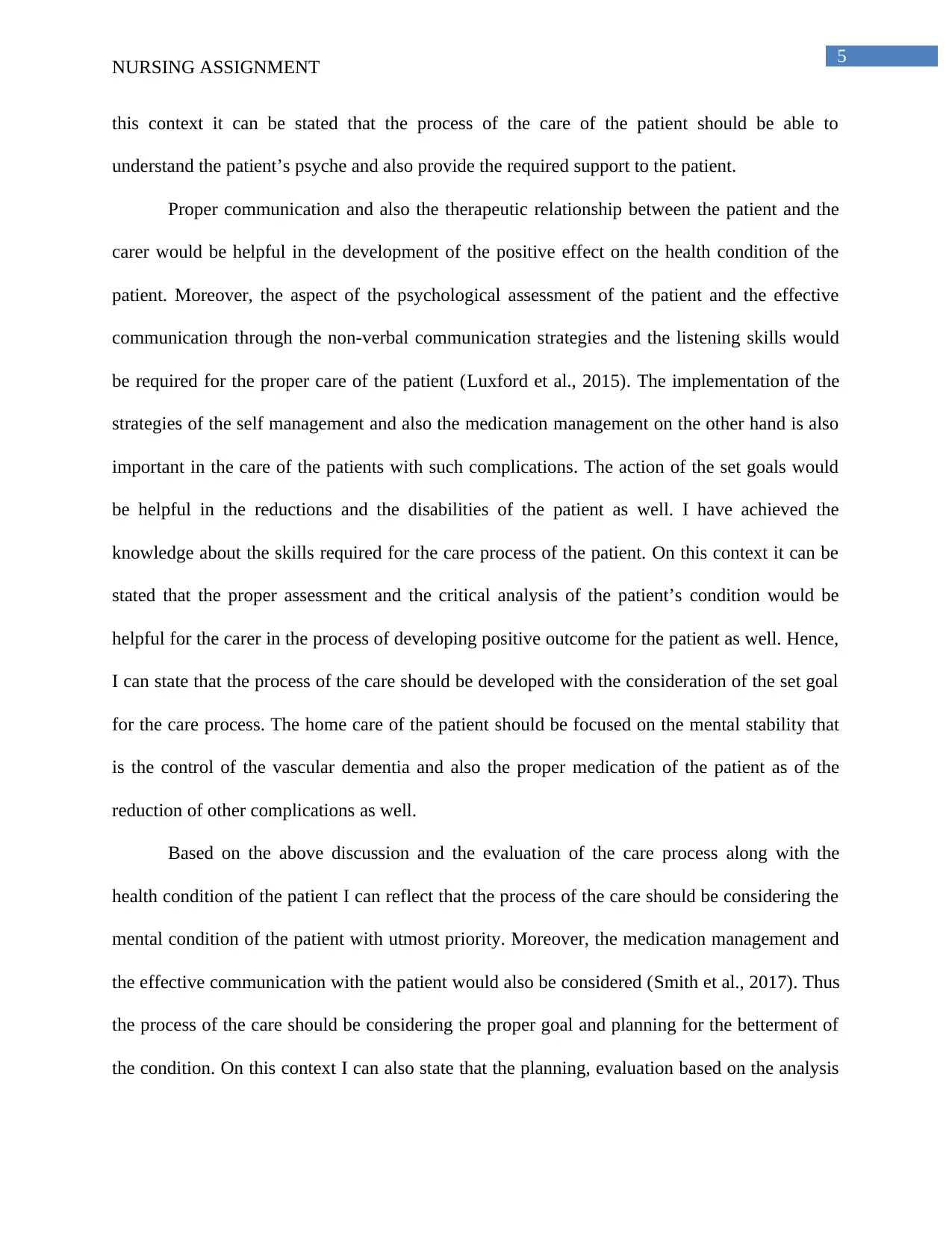
5
NURSING ASSIGNMENT
this context it can be stated that the process of the care of the patient should be able to
understand the patient’s psyche and also provide the required support to the patient.
Proper communication and also the therapeutic relationship between the patient and the
carer would be helpful in the development of the positive effect on the health condition of the
patient. Moreover, the aspect of the psychological assessment of the patient and the effective
communication through the non-verbal communication strategies and the listening skills would
be required for the proper care of the patient (Luxford et al., 2015). The implementation of the
strategies of the self management and also the medication management on the other hand is also
important in the care of the patients with such complications. The action of the set goals would
be helpful in the reductions and the disabilities of the patient as well. I have achieved the
knowledge about the skills required for the care process of the patient. On this context it can be
stated that the proper assessment and the critical analysis of the patient’s condition would be
helpful for the carer in the process of developing positive outcome for the patient as well. Hence,
I can state that the process of the care should be developed with the consideration of the set goal
for the care process. The home care of the patient should be focused on the mental stability that
is the control of the vascular dementia and also the proper medication of the patient as of the
reduction of other complications as well.
Based on the above discussion and the evaluation of the care process along with the
health condition of the patient I can reflect that the process of the care should be considering the
mental condition of the patient with utmost priority. Moreover, the medication management and
the effective communication with the patient would also be considered (Smith et al., 2017). Thus
the process of the care should be considering the proper goal and planning for the betterment of
the condition. On this context I can also state that the planning, evaluation based on the analysis
NURSING ASSIGNMENT
this context it can be stated that the process of the care of the patient should be able to
understand the patient’s psyche and also provide the required support to the patient.
Proper communication and also the therapeutic relationship between the patient and the
carer would be helpful in the development of the positive effect on the health condition of the
patient. Moreover, the aspect of the psychological assessment of the patient and the effective
communication through the non-verbal communication strategies and the listening skills would
be required for the proper care of the patient (Luxford et al., 2015). The implementation of the
strategies of the self management and also the medication management on the other hand is also
important in the care of the patients with such complications. The action of the set goals would
be helpful in the reductions and the disabilities of the patient as well. I have achieved the
knowledge about the skills required for the care process of the patient. On this context it can be
stated that the proper assessment and the critical analysis of the patient’s condition would be
helpful for the carer in the process of developing positive outcome for the patient as well. Hence,
I can state that the process of the care should be developed with the consideration of the set goal
for the care process. The home care of the patient should be focused on the mental stability that
is the control of the vascular dementia and also the proper medication of the patient as of the
reduction of other complications as well.
Based on the above discussion and the evaluation of the care process along with the
health condition of the patient I can reflect that the process of the care should be considering the
mental condition of the patient with utmost priority. Moreover, the medication management and
the effective communication with the patient would also be considered (Smith et al., 2017). Thus
the process of the care should be considering the proper goal and planning for the betterment of
the condition. On this context I can also state that the planning, evaluation based on the analysis
⊘ This is a preview!⊘
Do you want full access?
Subscribe today to unlock all pages.

Trusted by 1+ million students worldwide
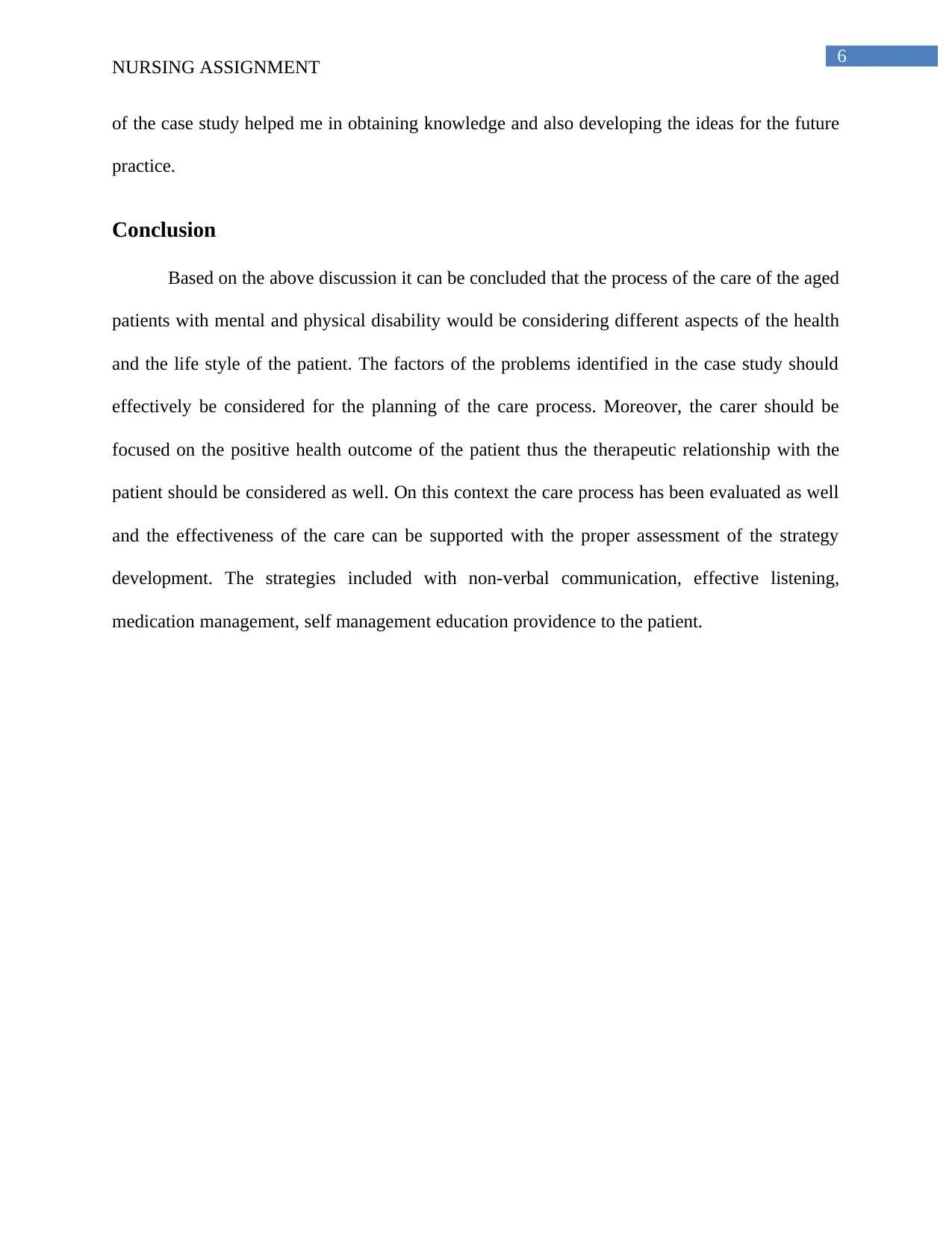
6
NURSING ASSIGNMENT
of the case study helped me in obtaining knowledge and also developing the ideas for the future
practice.
Conclusion
Based on the above discussion it can be concluded that the process of the care of the aged
patients with mental and physical disability would be considering different aspects of the health
and the life style of the patient. The factors of the problems identified in the case study should
effectively be considered for the planning of the care process. Moreover, the carer should be
focused on the positive health outcome of the patient thus the therapeutic relationship with the
patient should be considered as well. On this context the care process has been evaluated as well
and the effectiveness of the care can be supported with the proper assessment of the strategy
development. The strategies included with non-verbal communication, effective listening,
medication management, self management education providence to the patient.
NURSING ASSIGNMENT
of the case study helped me in obtaining knowledge and also developing the ideas for the future
practice.
Conclusion
Based on the above discussion it can be concluded that the process of the care of the aged
patients with mental and physical disability would be considering different aspects of the health
and the life style of the patient. The factors of the problems identified in the case study should
effectively be considered for the planning of the care process. Moreover, the carer should be
focused on the positive health outcome of the patient thus the therapeutic relationship with the
patient should be considered as well. On this context the care process has been evaluated as well
and the effectiveness of the care can be supported with the proper assessment of the strategy
development. The strategies included with non-verbal communication, effective listening,
medication management, self management education providence to the patient.
Paraphrase This Document
Need a fresh take? Get an instant paraphrase of this document with our AI Paraphraser
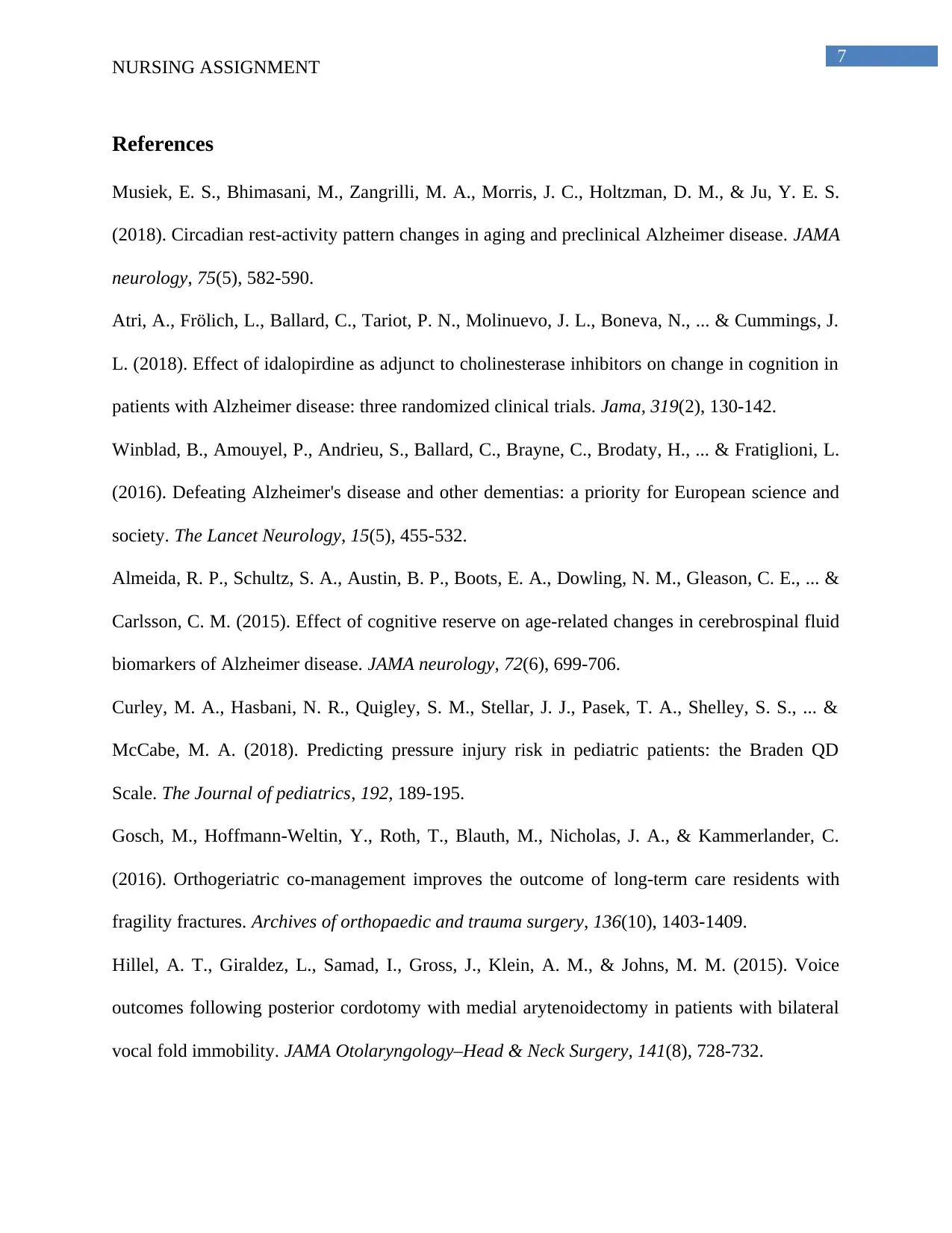
7
NURSING ASSIGNMENT
References
Musiek, E. S., Bhimasani, M., Zangrilli, M. A., Morris, J. C., Holtzman, D. M., & Ju, Y. E. S.
(2018). Circadian rest-activity pattern changes in aging and preclinical Alzheimer disease. JAMA
neurology, 75(5), 582-590.
Atri, A., Frölich, L., Ballard, C., Tariot, P. N., Molinuevo, J. L., Boneva, N., ... & Cummings, J.
L. (2018). Effect of idalopirdine as adjunct to cholinesterase inhibitors on change in cognition in
patients with Alzheimer disease: three randomized clinical trials. Jama, 319(2), 130-142.
Winblad, B., Amouyel, P., Andrieu, S., Ballard, C., Brayne, C., Brodaty, H., ... & Fratiglioni, L.
(2016). Defeating Alzheimer's disease and other dementias: a priority for European science and
society. The Lancet Neurology, 15(5), 455-532.
Almeida, R. P., Schultz, S. A., Austin, B. P., Boots, E. A., Dowling, N. M., Gleason, C. E., ... &
Carlsson, C. M. (2015). Effect of cognitive reserve on age-related changes in cerebrospinal fluid
biomarkers of Alzheimer disease. JAMA neurology, 72(6), 699-706.
Curley, M. A., Hasbani, N. R., Quigley, S. M., Stellar, J. J., Pasek, T. A., Shelley, S. S., ... &
McCabe, M. A. (2018). Predicting pressure injury risk in pediatric patients: the Braden QD
Scale. The Journal of pediatrics, 192, 189-195.
Gosch, M., Hoffmann-Weltin, Y., Roth, T., Blauth, M., Nicholas, J. A., & Kammerlander, C.
(2016). Orthogeriatric co-management improves the outcome of long-term care residents with
fragility fractures. Archives of orthopaedic and trauma surgery, 136(10), 1403-1409.
Hillel, A. T., Giraldez, L., Samad, I., Gross, J., Klein, A. M., & Johns, M. M. (2015). Voice
outcomes following posterior cordotomy with medial arytenoidectomy in patients with bilateral
vocal fold immobility. JAMA Otolaryngology–Head & Neck Surgery, 141(8), 728-732.
NURSING ASSIGNMENT
References
Musiek, E. S., Bhimasani, M., Zangrilli, M. A., Morris, J. C., Holtzman, D. M., & Ju, Y. E. S.
(2018). Circadian rest-activity pattern changes in aging and preclinical Alzheimer disease. JAMA
neurology, 75(5), 582-590.
Atri, A., Frölich, L., Ballard, C., Tariot, P. N., Molinuevo, J. L., Boneva, N., ... & Cummings, J.
L. (2018). Effect of idalopirdine as adjunct to cholinesterase inhibitors on change in cognition in
patients with Alzheimer disease: three randomized clinical trials. Jama, 319(2), 130-142.
Winblad, B., Amouyel, P., Andrieu, S., Ballard, C., Brayne, C., Brodaty, H., ... & Fratiglioni, L.
(2016). Defeating Alzheimer's disease and other dementias: a priority for European science and
society. The Lancet Neurology, 15(5), 455-532.
Almeida, R. P., Schultz, S. A., Austin, B. P., Boots, E. A., Dowling, N. M., Gleason, C. E., ... &
Carlsson, C. M. (2015). Effect of cognitive reserve on age-related changes in cerebrospinal fluid
biomarkers of Alzheimer disease. JAMA neurology, 72(6), 699-706.
Curley, M. A., Hasbani, N. R., Quigley, S. M., Stellar, J. J., Pasek, T. A., Shelley, S. S., ... &
McCabe, M. A. (2018). Predicting pressure injury risk in pediatric patients: the Braden QD
Scale. The Journal of pediatrics, 192, 189-195.
Gosch, M., Hoffmann-Weltin, Y., Roth, T., Blauth, M., Nicholas, J. A., & Kammerlander, C.
(2016). Orthogeriatric co-management improves the outcome of long-term care residents with
fragility fractures. Archives of orthopaedic and trauma surgery, 136(10), 1403-1409.
Hillel, A. T., Giraldez, L., Samad, I., Gross, J., Klein, A. M., & Johns, M. M. (2015). Voice
outcomes following posterior cordotomy with medial arytenoidectomy in patients with bilateral
vocal fold immobility. JAMA Otolaryngology–Head & Neck Surgery, 141(8), 728-732.
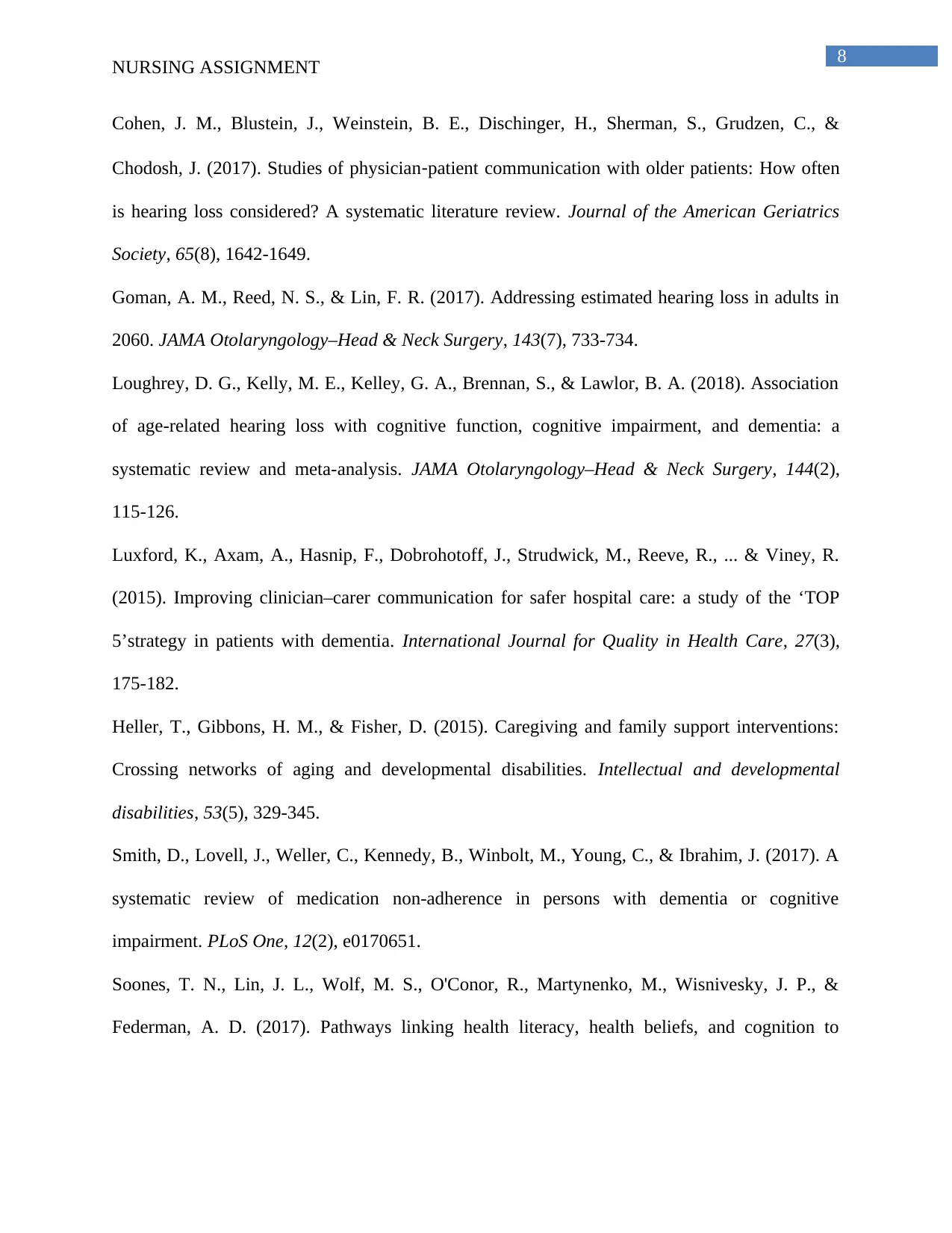
8
NURSING ASSIGNMENT
Cohen, J. M., Blustein, J., Weinstein, B. E., Dischinger, H., Sherman, S., Grudzen, C., &
Chodosh, J. (2017). Studies of physician‐patient communication with older patients: How often
is hearing loss considered? A systematic literature review. Journal of the American Geriatrics
Society, 65(8), 1642-1649.
Goman, A. M., Reed, N. S., & Lin, F. R. (2017). Addressing estimated hearing loss in adults in
2060. JAMA Otolaryngology–Head & Neck Surgery, 143(7), 733-734.
Loughrey, D. G., Kelly, M. E., Kelley, G. A., Brennan, S., & Lawlor, B. A. (2018). Association
of age-related hearing loss with cognitive function, cognitive impairment, and dementia: a
systematic review and meta-analysis. JAMA Otolaryngology–Head & Neck Surgery, 144(2),
115-126.
Luxford, K., Axam, A., Hasnip, F., Dobrohotoff, J., Strudwick, M., Reeve, R., ... & Viney, R.
(2015). Improving clinician–carer communication for safer hospital care: a study of the ‘TOP
5’strategy in patients with dementia. International Journal for Quality in Health Care, 27(3),
175-182.
Heller, T., Gibbons, H. M., & Fisher, D. (2015). Caregiving and family support interventions:
Crossing networks of aging and developmental disabilities. Intellectual and developmental
disabilities, 53(5), 329-345.
Smith, D., Lovell, J., Weller, C., Kennedy, B., Winbolt, M., Young, C., & Ibrahim, J. (2017). A
systematic review of medication non-adherence in persons with dementia or cognitive
impairment. PLoS One, 12(2), e0170651.
Soones, T. N., Lin, J. L., Wolf, M. S., O'Conor, R., Martynenko, M., Wisnivesky, J. P., &
Federman, A. D. (2017). Pathways linking health literacy, health beliefs, and cognition to
NURSING ASSIGNMENT
Cohen, J. M., Blustein, J., Weinstein, B. E., Dischinger, H., Sherman, S., Grudzen, C., &
Chodosh, J. (2017). Studies of physician‐patient communication with older patients: How often
is hearing loss considered? A systematic literature review. Journal of the American Geriatrics
Society, 65(8), 1642-1649.
Goman, A. M., Reed, N. S., & Lin, F. R. (2017). Addressing estimated hearing loss in adults in
2060. JAMA Otolaryngology–Head & Neck Surgery, 143(7), 733-734.
Loughrey, D. G., Kelly, M. E., Kelley, G. A., Brennan, S., & Lawlor, B. A. (2018). Association
of age-related hearing loss with cognitive function, cognitive impairment, and dementia: a
systematic review and meta-analysis. JAMA Otolaryngology–Head & Neck Surgery, 144(2),
115-126.
Luxford, K., Axam, A., Hasnip, F., Dobrohotoff, J., Strudwick, M., Reeve, R., ... & Viney, R.
(2015). Improving clinician–carer communication for safer hospital care: a study of the ‘TOP
5’strategy in patients with dementia. International Journal for Quality in Health Care, 27(3),
175-182.
Heller, T., Gibbons, H. M., & Fisher, D. (2015). Caregiving and family support interventions:
Crossing networks of aging and developmental disabilities. Intellectual and developmental
disabilities, 53(5), 329-345.
Smith, D., Lovell, J., Weller, C., Kennedy, B., Winbolt, M., Young, C., & Ibrahim, J. (2017). A
systematic review of medication non-adherence in persons with dementia or cognitive
impairment. PLoS One, 12(2), e0170651.
Soones, T. N., Lin, J. L., Wolf, M. S., O'Conor, R., Martynenko, M., Wisnivesky, J. P., &
Federman, A. D. (2017). Pathways linking health literacy, health beliefs, and cognition to
⊘ This is a preview!⊘
Do you want full access?
Subscribe today to unlock all pages.

Trusted by 1+ million students worldwide
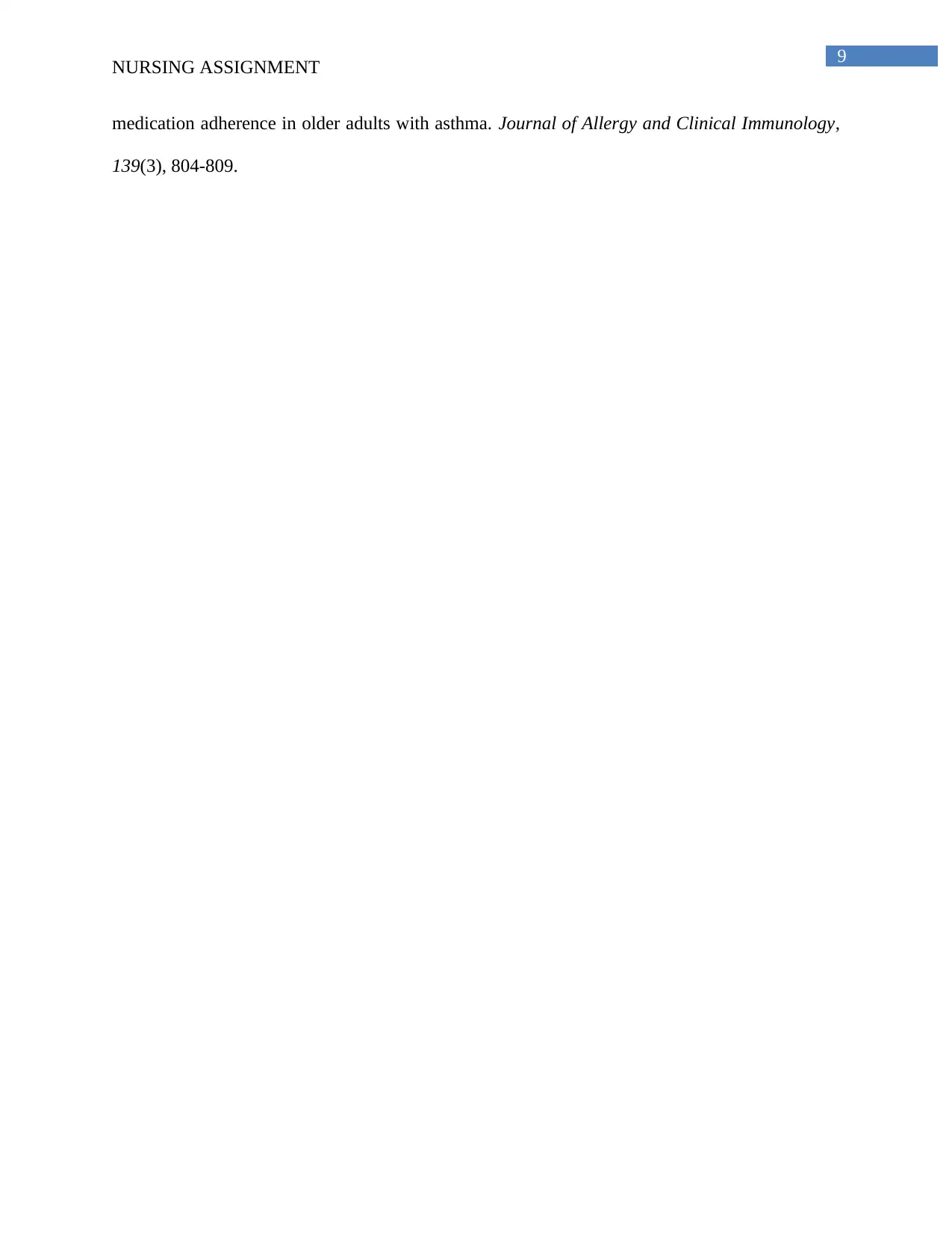
9
NURSING ASSIGNMENT
medication adherence in older adults with asthma. Journal of Allergy and Clinical Immunology,
139(3), 804-809.
NURSING ASSIGNMENT
medication adherence in older adults with asthma. Journal of Allergy and Clinical Immunology,
139(3), 804-809.
1 out of 10
Related Documents
Your All-in-One AI-Powered Toolkit for Academic Success.
+13062052269
info@desklib.com
Available 24*7 on WhatsApp / Email
![[object Object]](/_next/static/media/star-bottom.7253800d.svg)
Unlock your academic potential
Copyright © 2020–2025 A2Z Services. All Rights Reserved. Developed and managed by ZUCOL.




